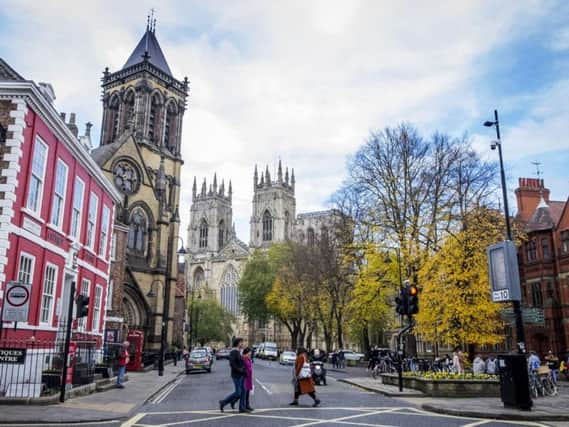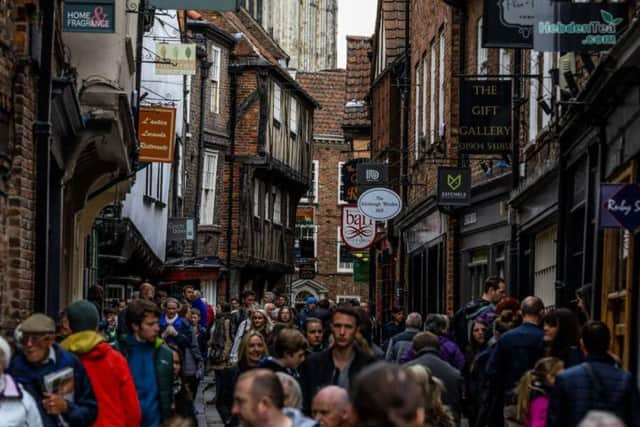York local elections: History in the making as city votes on new balance of power


Such is the storied history of York that anyone charting who was in control of the ancient city over the last two millennia would need to think in terms of decades rather than years. The Romans lasted for more than 300 years after invading in 71AD while the Vikings held the city for two centuries.
The nature of modern politics means domination of York's affairs is rather more fleeting these days, with control of City of York Council changing hands three times since 2007.
Advertisement
Hide AdAdvertisement
Hide AdAnd ahead of the next round of local elections, where all 47 council seats will be up for grabs, it is suggested there could be another changing of the guard amid an atmosphere of distrust in politicians caused by the ongoing Brexit deadlock.


Though a Conservative-Liberal Democrat coalition has been in power since 2015, Tory peer and elections analyst Lord Hayward says he expects Labour to win it back on May 3.
“The Tories did pretty well and have come back from the dead over the last ten years but they are likely to lose seats particularly to the Lib Dems, but I think Labour will actually take control,” he told The Yorkshire Post.
Advertisement
Hide AdAdvertisement
Hide AdAs it stands, Labour has more councillors than any other party but is some way short of a majority, while the Conservatives and Liberal Democrats have 21 councillors between them. There are four Green councillors and nine independents of varying hues.
Adding to the feeling of uncertainty is the changing leadership of the York Conservatives. Last January leader David Carr was forced out after a vote of no confidence from his own colleagues, to be replaced by Ian Gillies.
But Coun Gillies' own stint in charge lasted little over a year, with the former police officer announcing he would be stepping down due to a lack of support from his fellow Tories and the difficulty in keeping both sides of the coalition - and council officers - onside.
Deputy leader Stuart Rawlings is keen to accentuate the positive when he talks to The Yorkshire Post about his party's prospects, citing the promised £35m investment in the city's congested outer ring road and the imminent completion of the long-awaited community stadium for York City Football Club and York City Knights Rugby League Football Club.
Advertisement
Hide AdAdvertisement
Hide AdHe says the Conservatives will hand more control over where money on road improvements is spent to local ward councillors, and pledges to set up a 'help to grow' scheme for independent businesses to tackle the situation where large employers and retail schemes get all the attention.
Coun Rawlings said: "“Amongst issues we will move forward on are the protection of front line services, an increased council-house building programme, commitment to developing a riverside walkway along with our pledge to create and maintain pocket parks throughout the city and a freeze on council tax which we believe is achievable without risking funding for the council’s essential services.”
In a city where development is constrained because of its ancient structures and a lack of available space, the question of housing and where it goes remains a hot topic.
Advertisement
Hide AdAdvertisement
Hide AdAfter a long delay, the city's Local Plan document, which sets out what houses are built and where in York during the next 15 years. has been submitted and awaits scrutiny from government inspectors.
And the landmark York Central scheme, which would bring 2,500 homes and 86,600 square metres of office space to an area behind York railway station, has also divided opinion despite getting outline planning approval last month.
Janet Looker, leader of York's Labour group, said she was "disappointed that the site was seen to be much more focused as a housing development".
She told The Yorkshire Post: "Our approach to York Central would have been slightly different. To create a commercial business sector seems to me to have a unique offer all across the country."
Advertisement
Hide AdAdvertisement
Hide AdDescribing a "housing crisis" in the city, she talks about creating a more affordable basis for buying and renting.
She said: "We can't just do it as a council, it will mean working with some of the developers and I want to see if we can do business with some of the housing associations to see if we can put some of our mutual powers together.
"At the moment, particularly if you look at key workers, they are increasingly finding it more difficult to live in the city.
"We want to try and invest in the city to create a more broad-based economy. At the moment, because of the way York has become a very tourist and retail-based city our wages are not the highest."
Advertisement
Hide AdAdvertisement
Hide AdOther priorities for Labour include making York carbon neutral by 2030, and Coun Looker proposes a citizens' forum to get a consensus from residents about what would work best.
The Liberal Democrats, who make up the ruling coalition, used feedback from a consultation last year to develop its manifesto. Key pledges include setting up a new street environment service to address fly-tipping and illegal parking, creating York's first climate commissions and increasing investment in frontline services.
Group leader Keith Aspden said: "In York and Westminster, the Labour and Conservative parties are not focused on delivering outcomes and continue to tear themselves apart, ignoring the aspirations of residents.
"Our candidates in York bring a diverse range of skills and experience, including teaching, service in the armed forces, business and floristry. With more community focused and hardworking Liberal Democrat councillors elected this May, we will deliver on resident’s priorities."
Advertisement
Hide AdAdvertisement
Hide AdWith another coalition likely after May 3, the Green party has pledged to "help steer the direction of the council, regardless of which party has the largest number of seats".
Group leader Andy D’Agorne said: "Our vision is for a council that works with residents to tackle the challenges of creating a greener, cleaner, more caring city which has affordable housing, well paid worthwhile secure jobs, low crime, quality education, safe attractive green spaces close to where people live, good public transport, safe and well maintained walking and cycling routes and a strategy to prepare for and mitigate climate change."
Political leaders in York must prioritise issues around transport, planning, housing, inward investment and tourism after the elections, according to Mike Cartwright, Policy & Representation Executive on the West and North Yorkshire Chamber of Commerce.
He said: “In particular, reducing congestion on the outer ring road – we’d prefer large parts of it, especially on the northern side, to be dualled but we support the planned roundabout upgrades as long as they can accommodate future dualling.
Advertisement
Hide AdAdvertisement
Hide Ad“Progress with adopting the Local Plan remains a long-standing sore, and there is growing concern that the York Central project could be pushed back.
“While we have a strong and vibrant city centre, we want to see more commercial space become available to assist with inward investment, and to support start-up and growing businesses.”
Despite the plethora of local issues to debate, there is a fear that the Brexit debate dominating the headlines will impact on voting patterns. Coun Rawlings admits Tory voters are more likely not to turn out than those of other parties, but hopes people will differentiate between local and national issues.
He says: "Protest vote in the European elections in May, don't leave yourself with a council that is not your choice by making a protest vote at the wrong time."
Advertisement
Hide AdAdvertisement
Hide AdBrexit: "The key thing is to try and get people to differentiate between local issues and national issues. it is an opportunity to get your council in place for the next four years. It is not the time for a protest vote on a national issue. There are a lot of people who are extremely disappointed , I would say across all parties.
"I do think Conservative voters are less likely to vote than other parties, because we are in government.
"Protest vote in the European elections in May, don't leave yourself with a council that is not your choice by making a protest vote at the wrong time."